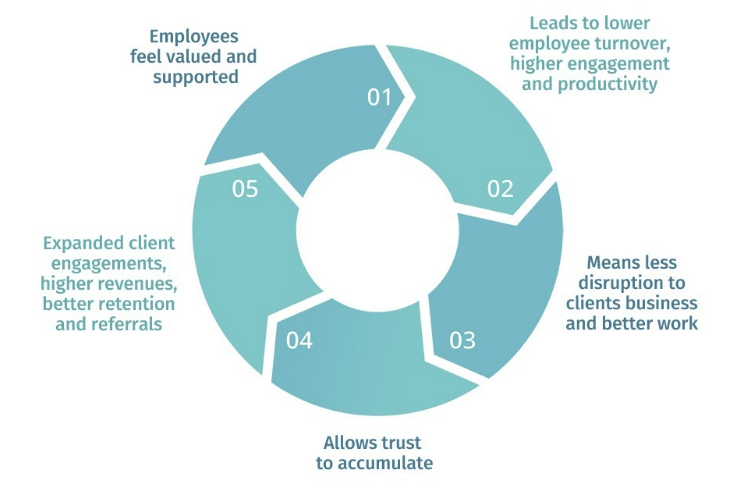
For centuries, we’ve been living in a world where the status of leaders has been significantly more important than the growth of those whom they lead. This kind of top-down, exclusive attitude has had far-reaching consequences in the world, from politics and business to our environment and even within our own homes.
Fortunately, demand is revolutionizing the qualities that effective leaders must possess — adding empathy, inclusivity, vulnerability and even love to effective leadership approaches. Today’s top leaders are not only smart and fully adept at what they do, they are active participants in the growth of those whom they lead.
Conscious Leadership Defined
Conscious leadership refers to guiding others with full awareness of the self and cultivating growth in organizations by supporting the people in them. Instead of an ego-centric ‘me’ attitude, a conscious leader embodies all aspects of an inclusive ‘we’ approach.
It all comes down to legacy: how much do you care about helping your people grow as individuals and professionals in order to achieve more than you did in your career?
Different leadership styles can certainly exist inside of the consciousness context, but here we’re talking about the binary between the conscious leader and the unconscious leader. Thankfully, position, status, professional title and hard skills are no longer how we’re defining leadership.
Conscious leaders are masters of self-awareness and continuously practice mindfulness. This enables them to regulate their emotions and (eventually) not have kneejerk reactions or the need to defend themselves. Instead, they own up to their mistakes, invite feedback in order to identify areas in need of improvement, and make decisions that serve to unify the group.
Conversely, unconscious leaders either dwell on their own emotions or power through and pretend they don’t have any, tend to dismiss the emotions of others, can be reactive, and they make decisions, often unilaterally, that are in their own best interest.
6 Signals That Indicate You May Be Stuck
No one likes to hit a plateau or back peddle and not understand why or how to get out of a rut. But when it happens, there are often of a series of underlying issues that need to be addressed, some deeper and more complex than others. If some of the following signals seem to resonate with your current situation, it may be time to start doing some self-discovery, shadow work therapy, somatic emotional release, conscious leadership training, or the path that you find works best for you.
Constantly Seeking Approval
Receiving praise for an accomplishment is fine, but when you find yourself fishing for compliments after every task or win, there may some deep-seated emotional issues to explore and resolve in order to become a more secure leader.
Working Harder with No Obvious Gain
No matter how many hours you work, your earnings remain the same or decrease during some months, and the situation remains a mystery. It causes frustration, self-doubt and a feeling that something has to change.
Low or Negative Profits
Sometimes, there are external factors beyond your control that deal you a bad blow. But if you find that your profit margin is very low, at breakeven or consistently in the red, it could very well indicate a leadership challenge at the core.
More Talking than Listening
When you talk more than you listen, you can’t understand or address issues properly, which means that they tend to arise over and over again. Conscious leaders don’t listen to respond, they listen actively and intently in order to understand. Then, they collaborate to resolve challenges.
Little to No Input From Your Team
When your team is silent in meetings or when asked for ideas, feedback, etc., they most likely feel that they’ll either be dismissed or their opinions don’t matter to you as the leader. If you don’t create a safe space for their voices to be heard, resentment can build — and that can lead to internal friction and/or high attrition.
No Demonstration of Vulnerability or Accountability
The parts of you that make you human are what make you relatable to others. If you feel as though you need to have all the answers all the time, you’re essentially alienating those around you. There’s simply no room for them, and it causes you unnecessary stress and pressure. And when you make a mistake (because you will), refusing to acknowledge it and take responsibility often causes a detrimental impact spiral.
How Conscious Leadership Informs Organizational Success
Let’s define success as leading collaborative teams of people who are engaged because they feel valued in every way. Why does engagement, beyond fulfillment, matter? Because it naturally leads to higher productivity and more effective work products, which leads to increased client retention and new business, which generates more revenue and higher profit margins. It’s the money-follows-value mindset and proven methodology that ensures holistic success, beyond measuring profit as the solitary indicator of success.
Money Follows Value
See, I haven’t avoided the financial responsibility conversation; I’ve been building up to it. Here’s the illustrated outcome of service-based companies run by conscious leaders:

Conscious leadership calls those at the top to not just focus on business, but also requires that we work on self-limiting beliefs, value-centricity, and how all of that expresses as leader, spouse, parent, and community member. The following top qualities of conscious leaders help their organizations to succeed:
High Level of Self-Awareness
When a leader knows themselves well, that knowledge helps them to regulate their emotions and be more intentional in their behavior and actions in different circumstances, which results in positive interactions and outcomes with team members, partners, clients, and prospects.
Level-Headedness
A calm and sensible leader is trusted more than one who is impulsive and reactive. Conflict is sure to arise in business, and when it does, a conscious leader approaches the situation in a way that allows people to feel heard and secure.
Intentionality
When you’re intentional you have a purpose behind every activity. For the conscious leader, the intention is communicated so that it also works to set an example for others to bring more intention to their own interactions and work.
Continuous Self-Improvement
More knowledge means more expertise and ultimately a better future. In this case, it often leads you to seek coaching in the arena of mindset, shadow work, and overall leadership development for the benefit of your team, yourself and the organization as a whole.
Compassionate
Compassion is a key character trait for conscious leaders. It adorns the way they speak, address challenges, and encourage others to improve. With time, this sets the precedent and becomes the company culture itself.
Why Is Change Beckoning?
For most business leaders, how we’ve been leading our teams cannot and will not look anything like it did in the past. The period of cocooning we’ve all experienced over the majority of 2020 provided the opportunity for some serious introspection. We are now at the inflection point for leaders and employees alike, in that we’ve been given the permission we needed to pause, dive inward, learn who we are, what we really want, and what kind of legacy we want to leave.
Conscious leadership is in high demand because the prior paradigm of fear-based, top-down, win-at-all-costs management is collapsing — and the call to become our true selves is very loud. Even if you’re skeptical about the in-progress collapse, I’m sure that we can at least agree that it was never sustainable to devalue people and the planet for the sole purpose of profit.
People want to work at organizations with people who value their input, support their individual desires for growth and expansion, and trust them to do good work on behalf of clients. Many of them want that to extend to the environment — to know that they work for a company that cares about its eco-impact, no matter how small. And they want to be able to trust conscious leaders who:
- know and trust themselves (instead of being unaware and insecure);
- take care of themselves (instead of burning out);
- regulate their emotions (instead of being reactive);
- express their vulnerability (instead of walling up);
- ask for input (instead of needing to have all the answers); and
- listen to understand (instead of to reply).
“Conscious awareness in the leader cultivates awareness in the system.”
— Dr. Cheryl Moen Vermey
If this is not how you lead today, can you imagine the liberation that comes with being wholly yourself? Not needing to solve everything yourself? Not wondering whether or not your employees will leave? It’s hard work to keep up two different personas — your authentic, genuine self at home and your boss persona at work — isn’t it?
The good news is that you don’t have to do it anymore.
Where to Begin
If all of this resonates, in that you’ve been thinking a lot about your organization and team, and how you show up for them as a leader — perhaps how that has impacted your spouse or family as well — then your natural next question might be, “How do I start to make the changes necessary to be in alignment with what I really want?”
As you’ve already recognized, awareness is the first step and it seems like your awareness has likely been growing day by day over the last year or more. For most leaders, working with a consultant, coach, speaker or workshop facilitator is the natural next step, so many people begin searching for the right person or firm. That search can take the form of tapping your network for referrals, running endless Google searches, or reaching out to experts that you come across on podcasts, in media articles or at conferences. Or, you can search the collective of diverse and trusted experts that have been hand-selected for this precise purpose.
The world is demanding a collective up-leveling, and wherever you are on this journey, we invite you to join us.
About the author
Kelly Campbell is the founder of Consciousness Leaders and Trauma-Informed Conscious Leadership Coach to self-aware visionaries. She writes for Entrepreneur and has written for Forbes. They are the author of "Heal to Lead" (Wiley, 2024), a new book on transforming past trauma in order to uncover our innate leadership power.

